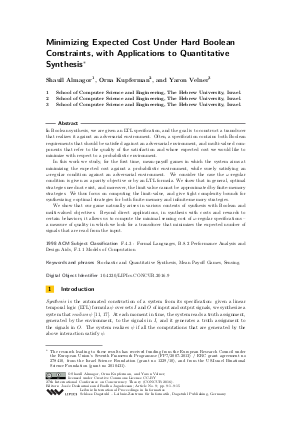Minimizing Expected Cost Under Hard Boolean Constraints, with Applications to Quantitative Synthesis
Authors Shaull Almagor, Orna Kupferman, Yaron Velner
-
Part of:
Volume:
27th International Conference on Concurrency Theory (CONCUR 2016)
Part of: Series: Leibniz International Proceedings in Informatics (LIPIcs)
Part of: Conference: International Conference on Concurrency Theory (CONCUR) - License:
 Creative Commons Attribution 3.0 Unported license
Creative Commons Attribution 3.0 Unported license
- Publication Date: 2016-08-24
File

PDF
LIPIcs.CONCUR.2016.9.pdf
- Filesize: 491 kB
- 15 pages
Document Identifiers
Subject Classification
Keywords
- Stochastic and Quantitative Synthesis
- Mean Payoff Games
- Sensing.
Metrics
- Access Statistics
-
Total Accesses (updated on a weekly basis)
0PDF Downloads0Metadata Views
Abstract
In Boolean synthesis, we are given an LTL specification, and the goal is to construct a transducer that realizes it against an adversarial environment. Often, a specification contains both Boolean requirements that should be satisfied against an adversarial environment, and multi-valued components that refer to the quality of the satisfaction and whose expected cost we would like to minimize with respect to a probabilistic environment. In this work we study, for the first time, mean-payoff games in which the system aims at minimizing the expected cost against a probabilistic environment, while surely satisfying an omega-regular condition against an adversarial environment. We consider the case the omega-regular condition is given as a parity objective or by an LTL formula. We show that in general, optimal strategies need not exist, and moreover, the limit value cannot be approximated by finite-memory strategies. We thus focus on computing the limit-value, and give tight complexity bounds for synthesizing epsilon-optimal strategies for both finite-memory and infinite-memory strategies. We show that our game naturally arises in various contexts of synthesis with Boolean and multi-valued objectives. Beyond direct applications, in synthesis with costs and rewards to certain behaviors, it allows us to compute the minimal sensing cost of omega-regular specifications -- a measure of quality in which we look for a transducer that minimizes the expected number of signals that are read from the input.
Cite As Get BibTex
Shaull Almagor, Orna Kupferman, and Yaron Velner. Minimizing Expected Cost Under Hard Boolean Constraints, with Applications to Quantitative Synthesis. In 27th International Conference on Concurrency Theory (CONCUR 2016). Leibniz International Proceedings in Informatics (LIPIcs), Volume 59, pp. 9:1-9:15, Schloss Dagstuhl – Leibniz-Zentrum für Informatik (2016)
https://doi.org/10.4230/LIPIcs.CONCUR.2016.9
BibTex
@InProceedings{almagor_et_al:LIPIcs.CONCUR.2016.9,
author = {Almagor, Shaull and Kupferman, Orna and Velner, Yaron},
title = {{Minimizing Expected Cost Under Hard Boolean Constraints, with Applications to Quantitative Synthesis}},
booktitle = {27th International Conference on Concurrency Theory (CONCUR 2016)},
pages = {9:1--9:15},
series = {Leibniz International Proceedings in Informatics (LIPIcs)},
ISBN = {978-3-95977-017-0},
ISSN = {1868-8969},
year = {2016},
volume = {59},
editor = {Desharnais, Jos\'{e}e and Jagadeesan, Radha},
publisher = {Schloss Dagstuhl -- Leibniz-Zentrum f{\"u}r Informatik},
address = {Dagstuhl, Germany},
URL = {https://drops.dagstuhl.de/entities/document/10.4230/LIPIcs.CONCUR.2016.9},
URN = {urn:nbn:de:0030-drops-61689},
doi = {10.4230/LIPIcs.CONCUR.2016.9},
annote = {Keywords: Stochastic and Quantitative Synthesis, Mean Payoff Games, Sensing.}
}
Author Details
References
-
S. Almagor, U. Boker, and O. Kupferman. Formalizing and reasoning about quality. Journal of the ACM, 63(3), 2016.

-
S. Almagor, D. Kuperberg, and O. Kupferman. Regular sensing. In 34th FSTTCS, volume 29 of LIPIcs, pages 161-173, 2014.

-
S. Almagor, D. Kuperberg, and O. Kupferman. The sensing cost of monitoring and synthesis. In 35th FSTTCS, volume 35 of LIPIcs, pages 380-393, 2015.

- Shaull Almagor, Orna Kupferman, and Yaron Velner. Minimizing expected cost under hard boolean constraints, with applications to quantitative synthesis. CoRR, abs/1604.07064, 2016. URL: http://arxiv.org/abs/1604.07064.
-
E. Arbel, O. Rokhlenko, and K. Yorav. Sat-based synthesis of clock gating functions using 3-valued abstraction. In FMCAD, pages 198-204, 2009.

-
Patricia Bouyer, Nicolas Markey, and Raj Mohan Matteplackel. Averaging in LTL. In 25th CONCUR, pages 266-280, 2014.

-
V. Bruyère, E. Filiot, M. Randour, and J-F. Raskin. Meet your expectations with guarantees: Beyond worst-case synthesis in quantitative games. In 31st STACS, volume 25 of LIPIcs, pages 199-213, 2014.

-
K. Chatterjee and L. Doyen. Energy and mean-payoff parity markov decision processes. In 36th MFCS, pages 206-218, 2011.

-
K. Chatterjee, L. Doyen, H. Gimbert, and Y. Oualhadj. Perfect-information stochastic mean-payoff parity games. In 17th FOSSACS, pages 210-225, 2014.

-
K. Chatterjee, Z. Komárková, and J. Kretínský. Unifying two views on multiple mean-payoff objectives in markov decision processes. In 30th LICS, pages 244-256, 2015.

-
A. Church. Logic, arithmetics, and automata. In Proc. Int. Congress of Mathematicians, 1962, pages 23-35. Institut Mittag-Leffler, 1963.

-
L. Clemente and J-F. Raskin. Multidimensional beyond worst-case and almost-sure problems for mean-payoff objectives. In 30th LICS, pages 257-268, 2015.

-
L. de Alfaro, M. Faella, T.A. Henzinger, R. Majumdar, and M. Stoelinga. Model checking discounted temporal properties. Theoretical Computer Science, 345(1):139-170, 2005.

-
M. Keating, D. Flynn, R. Aitken, A. Gibbons, and K. Shi. Low Power Methodology Manual. Springer, 2007.

-
O. Kupferman and M.Y. Vardi. Synthesis with incomplete information. In Advances in Temporal Logic, pages 109-127. Kluwer Academic Publishers, 2000.

-
A. Pnueli. The temporal semantics of concurrent programs. Theoretical Computer Science, 13:45-60, 1981.

-
A. Pnueli and R. Rosner. On the synthesis of a reactive module. In 16th POPL, pages 179-190, 1989.

-
M.L. Puterman. Markov decision processes: discrete stochastic dynamic programming. John Wiley &Sons, 2014.

-
M.Y. Vardi and P. Wolper. Reasoning about infinite computations. I&C, 115(1):1-37, 1994.

